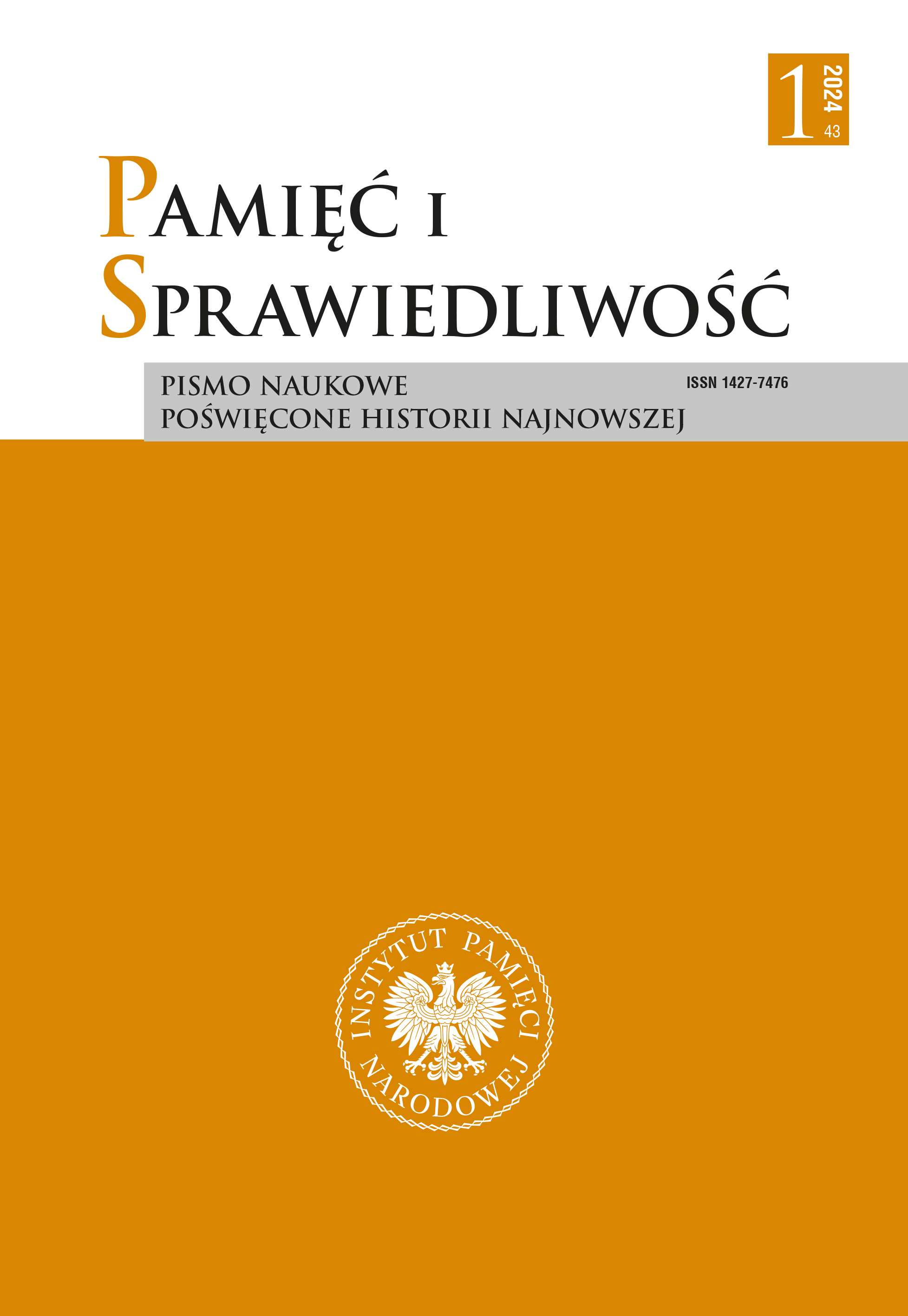A Competent and Exhaustive Monograph on the History of the Catholic Church and Catholics in Dramatic, Totalitarian Times (in Connection with the Book by Paweł Skibiński)
Remembrance and Justice, Vol. 43 No. 1 (2024), pages: 381-392
Publication date: 2024-08-09
 https://doi.org/10.48261/PIS244318
https://doi.org/10.48261/PIS244318
Abstract
The Catholic Church and its faithful were particularly exposed to repression in the period 1917–1989, when two totalitarian systems – fascist and communist ones – developed their criminal activities. Crimes – including genocide – and other repressions against Catholics had become an everyday occurrence. Paweł Skibiński’s findings show that Poles were particularly repressed by the Soviets and Germans because of their nationality and Catholicism. German concentration camps, including Dachau – the place of execution of many priests – and Soviet labor camps, as well as the Katyn Massacre, a particularly important event from the perspective of the fate of clergy of various denominations, have become symbols of their persecution. The research of the author of the reviewed monograph indicates that the repressions of the Third Reich affected Catholics in all the countries occupied by it during World War II and in Germany itself. In turn, Soviet repression became the norm against Catholics in those areas that were occupied by the Red Army during World War II and, after the war, found themselves in the sphere of influence of the USSR. After 1945, local communists, often trained in Moscow, supported the Soviets in their criminal activities. The author of the reviewed book noticed and discussed in detail the role of John Paul II in the process of dismantling the communist political system in Central and Eastern Europe in the late 1970s and 1980s.
Keywords
faszyzm • katolicy • Kościół katolicki • ludobójstwo • represje • stalinizm • zbrodnie fascism • Catholics • Catholic Church • genocide • repression • Stalinism • crimes
References
Antykomunizm Polaków XX wieku, red. P. Kardela, K. Sacewicz, Białystok–Olsztyn–Warszawa 2019.
„Bić takiego wroga jak kler”. Osoby duchowne i zakonne w miejscach odosobnienia za żelazną kurtyną, red. M. Grądzka-Rejak, ks. J. Marecki, Kraków 2016 (seria „Kościół w okowach”).
Ksiądz ppłk Andrzej Niwa (1900–1940), oprac. zespół autorski Stowarzyszenia Pamięci Kapelanów Katyńskich, red. B. Tarkowska, Warszawa 2019.
Ksiądz pułkownik dr Edmund Nowak (1891–1940). Dziekan Wojska Polskiego, oprac. B. Tarkowska, Warszawa 2019.
Maiestati Rei Publicae Reddere Proprium Decus. Majestatowi Rzeczypospolitej Polskiej przywrócić własną chwałę. Księga jubileuszowa z okazji 70. rocznicy urodzin prof. dr. hab. Wiesława Jana Wysockiego, red. ks. W. Gliński, Warszawa 2022.
Niezłomni ludzie Kościoła. Sylwetki, red. J. Żaryn, Warszawa 2011 (seria „Kościół w okowach”).
Obchody Millenium na uchodźstwie w 50. rocznicę, red. R. Łatka, J. Żaryn, Warszawa 2016.
Prymas Polski Stefan Kardynał Wyszyński na ziemi pomorskiej i Kujawach, red. M. Białkowski, W. Polak, Toruń 2014.
Skibiński P., Kościół wobec totalitaryzmów (1917–1989). Światowy katolicyzm i doświadczenia Polaków, Warszawa 2022.
Szwedo B., Wierni do końca. Kapelani wojskowi ofiary Zbrodni Katyńskiej, Warszawa 2020.
Tarkowska B., Ks. ppłk. Jan Leon Ziółkowski (1899–1940). Kapelani katyńscy 1940, Warszawa 2015.
Wolsza T., Częstochowa w latach 1957–1970 [w:] Częstochowa. Dzieje miasta i Klasztoru Jasnogórskiego, t. IV: Dzieje miasta i Klasztoru po 1945 r., red. K. Kersten, Częstochowa 2007.
Wolsza T., Działalność polityczna i poglądy Stanisława Sopickiego (1941–1976), „Polska 1944/45–1989. Studia i Materiały” 1999, t. IV.
Wolsza T., Za żelazną kurtyną. Europa Środkowo-Wschodnia, Związek Sowiecki i Józef Stalin w opiniach polskiej emigracji politycznej w Wielkiej Brytanii 1944/1945–1953, Warszawa 2005.
Żaryn J., Kościół w Polsce w latach przełomu (1953–1958). Relacje ambasadora RP przy Stolicy Apostolskiej, Warszawa 2000.
Żaryn J., Stolica Apostolska wobec Polski i Polaków w latach 1944–1958 w świetle materiałów Ambasady RP przy Watykanie, Warszawa 1998
License
Copyright (c) 2024 Remembrance and Justice

This work is licensed under a Creative Commons Attribution-NonCommercial-NoDerivatives 4.0 International License.
https://creativecommons.org/licenses/by-nc-nd/4.0
Most read articles by the same author(s)
- Tadeusz Wolsza, “If We Had Attended It Would Have Been a Disgrace to Polish Patriotism”. The Absence of Poles at the 1920 Olympics in Antwerp , Remembrance and Justice: Vol. 38 No. 2 (2021)
 Język Polski
Język Polski
 English
English
 Deutsch
Deutsch
 Français (France)
Français (France)
 Italiano
Italiano
 Русский
Русский



 PDF (Język Polski)
PDF (Język Polski)




